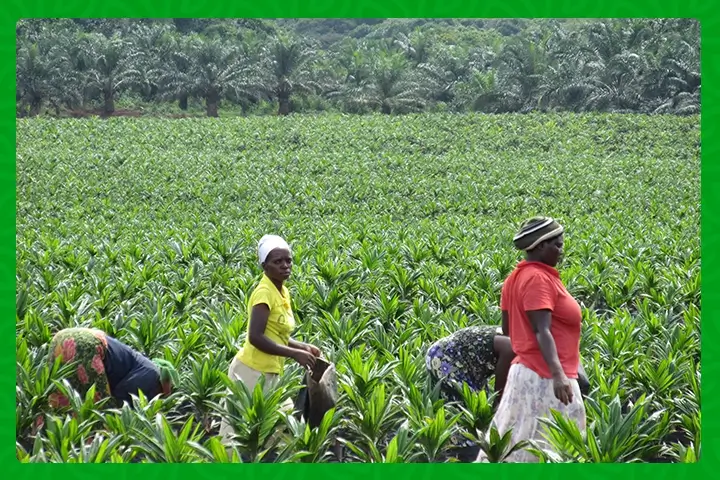

Christopher Burke
Senior Advisor, WMC Africa
Land tenure security, agricultural productivity and conflict are intricately related with significant implications for the socioeconomic landscape in Africa. As the continent grapples with the challenges of food insecurity, poverty and instability, understanding and addressing the relationship between these three elements is essential for food security and sustainable development.
Agriculture is the backbone of many African economies employing over 60 percent of the workforce and contributing significantly to food security and gross domestic product (GDP). Despite its importance, agricultural productivity in Africa remains low compared to global standards. Multiple factors contribute to this underperformance including limited access to modern farming techniques, inadequate infrastructure and climate change. A critical yet often overlooked factors is land tenure security.
Land tenure security refers to the assurance that land rights are recognized and protected, enabling landholders to use, manage and invest in their land without fear of arbitrary eviction. In many African countries, land tenure systems are characterized by a blend of formal statutory legal frameworks and customary practices resulting in legal ambiguities and disputes.
Secure land tenure is crucial for agricultural productivity. When farmers are confident of their land rights, they are more likely to invest in long-term improvements such as soil conservation, irrigation and crop diversification. These investments can lead to higher yields, improved food security and increased incomes. Conversely, insecure land tenure discourages investment and perpetuates low productivity and poverty.
Despite the paucity in empirical connections between the formalization of land tenure and agricultural productivity remain murky, particularly in sub-Saharan Africa, there is an increasing body of evidence demonstrating a positive correlation between the two. A study published in 2023 headed by veteran World Bank land governance analyst Frank Byamugisha examined various Sub-Saharan African countries, specifically Ethiopia, Madagascar, Malawi, Niger, Nigeria, Tanzania and Uganda. The study reported improvement in land tenure security led to increases in agricultural productivity ranging from modest gains up to a 45 percent increase in productivity in Ethiopia following land tenure reforms.
Conflict over land is a pervasive issue in Africa fueled by population pressures, historical grievances and competition for both renewable and non-renewable resources. Land disputes can escalate into violence, displacing communities, disrupting agricultural activities and destroying infrastructure. The consequences of such conflicts are severe: fields are left fallow, livestock is lost and essential agricultural inputs become inaccessible.
In areas prone to protracted civil conflict the breakdown of social order and the destruction of infrastructure further impede agricultural productivity. Farmers are unable to access markets, seeds and fertilizers. The lack of security deters investment. The resulting decline in agricultural output exacerbates food insecurity and poverty creating a vicious cycle that is difficult to break.
Less than 20 percent of land across Africa is currently registered. Unregistered land, and some registered land, is managed in accordance with traditional or customary norms, rules and procedures; most common in areas under communal ownership most common in regions dominated by pastoralists. Traditional leaders can provide social cohesion and a strong sense of identity. Customary systems can contribute to land tenure security when they are inclusive and well-functioning. However, conflicts often arise when customary rights are not recognized by formal legal frameworks, leading to legal disputes and uncertainty.
Moreover, modernization, urbanization and protracted civil conflict often contribute to the erosion of authority and capacity of traditional leaders. In these circumstances unscrupulous individuals, sometimes under the guise of traditional leadership, can take advantage of the situation to exercise exclusionary and discriminatory practices to the detriment of women and marginalized groups. Bridging the gap between customary and formal land tenure systems is essential to create a cohesive and equitable land governance framework.
A growing number of African countries have embarked on successful land reforms that provide valuable lessons for the continent. Customary land tenure is fully recognized under law in Uganda. Over the past decade or so, the Government of Uganda has successfully developed the Uganda National Land Information System (UgNLIS) in cooperation with the French firm IGN FI supported by the World Bank. The Ministry of Lands, Housing and Urban Development (MLHUD) is now fully computerized, however significantly less than 20 percent of the land has been formally registered.
A number of development partners including the United Nations (Food and Agricultural Organization (FAO), UN Habitat Global Land Tool Network (GLTN), GIZ, ZOA, the Cadasta Foundation and CORDAID have implemented initiatives to register customary land utilizing digital processes to be integrated with the UgNLIS. MLHUD Spokesman Dennis Obbo reports a significant drop in land related conflict in areas where customary land has been registered.
Rwanda’s Land Tenure Regularization program, initiated in 2005, has registered over 11 million parcels of land, providing legal recognition and protection to landholders. This systematic registration has also reduced land disputes, increased investment in agriculture and enhanced productivity according to Jossam Potel, a senior land tenure specialist with Landesa in Rwanda. Ethiopia’s land certification program is another example of effective land reform. Through the issuance of certificates that recognize land use rights, the program has improved tenure security for millions of smallholder farmers and led to increased investments in land improvements and higher agricultural yields.
Gender disparities in land tenure are a significant issue in Africa. Women, who make up a large proportion of the agricultural workforce, often face barriers to land ownership and control due to the discriminatory implementation of laws and customs. Ensuring gender equity in land tenure systems is critical for boosting agricultural productivity and achieving sustainable development.
Policies that promote women’s land rights such as joint land titling and legal reforms to protect women’s inheritance rights are essential. Empowering women with secure land tenure can lead to increased agricultural output, improved family welfare and greater resilience to economic and environmental shocks.
To address complex interconnected issues of agricultural productivity, land tenure security and conflict; African countries would do well to continue the pursuit of comprehensive land reforms. These reforms should aim to strengthen legal frameworks to harmonize formal and customary land tenure systems to provide providing clear, legally recognized rights to all landholders.
Policies should address historical injustices and promote equitable access to land. Enhancing land administration are vital steps to strengthen transparent and efficient land administration systems capable of resolving disputes and the simplification of land registration processes to ensure accessibility and affordability. The modernization of land records, training officials and leveraging technology for land management are essential. Land tenure reforms should promote inclusivity and protect the rights of women, youth and marginalized groups.
It is important to effectively engage local communities in the design and implementation of land reforms. Community participation and broad acceptance will enhance the legitimacy, effectiveness and sustainability of land governance related policies. Farmers will be more likely to invest in land improvements and adopt more sustainable agricultural practices. Secure land tenure encourages long-term investments in agriculture boosting productivity and resilience.
The connection between agricultural productivity and land tenure security is a critical area of focus for Africa’s sustainable development. The implementation of comprehensive land reforms that promote security, inclusivity and sustainability proved African countries with an opportunity to unlock the full potential of their agricultural sectors. This will foster economic growth, reduce poverty and enhance food security, paving the way for a more prosperous and stable continent.
End
Christopher Burke is a senior advisor at WMC Africa, a communications and advisory agency located in Kampala, Uganda. With nearly 30 years of experience, he has worked extensively on social, political and economic development issues, focused on agriculture, land governance, communications, conflict mediation and peace-building in Asia and Africa.


















